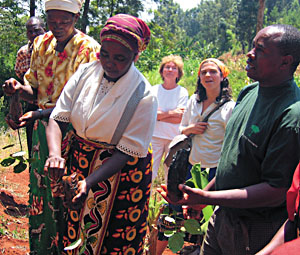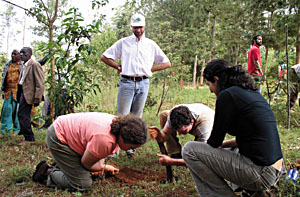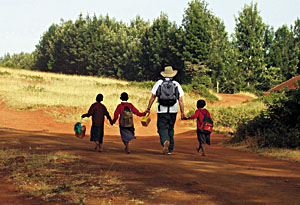 | Women with the Green Belt Movement in the village of Miricu, Murang'a, Kenya, show F&ES students how they grow seedlings to later reforest their lands. |
Faculty and students at the School of Forestry & Environmental Studies (F&ES) say that a recent course offered by the school stands as a vivid showcase of Yale's global reach and aspirations.
The seminar gave students the opportunity to examine global environmental governance by assessing the effectiveness of the United Nations Environment Programme (UNEP). Beyond the benefits of examining UNEP under the guidance of the course's expert instructors, the students were able to travel to Nairobi, Kenya, to present their findings to UNEP at its international conference.
Many of the students say it was an invaluable experience to see both the working of global environmental governance at the highest level and the tangible grassroots work of Maathai and her colleagues.
"We met the objectives of the class to study an international conference and the organization that sponsors it," says Gordon Geballe, associate dean for student and alumni affairs at F&ES and lecturer in urban planning, one of the course's instructors. "We went beyond expectations by providing external evaluation that was taken seriously by UNEP's leadership. We are able to showcase F&ES and Yale as global institutions. We heard from a Nobel Peace Prize winner and were able to participate directly in the program for which she won the prize."
Although the course was offered in the fall semester, the trip to Nairobi took place during the spring semester, when the UNEP conference was scheduled. Geballe noted that he proctored an exam that some of the students had to take in another course during the long plane trip to Kenya.
Christine Kim, research associate for the class and for the Yale Center for Environmental Law & Policy, says that the class put the students in the role of "pro bono consultants" who gave UNEP's Governing Council a useful outside assessment of its progress.
"The students worked very, very hard and pulled off an amazing presentation," she says. "There was a lot of buzz about the presentation afterwards."
Among the students' recommendations ,was that UNEP aspire to become the comprehensive, consolidated information source on all environmental issues, trends, risks, best practices and capacity building needs around the globe. Ivanova notes that a number of UNEP officials described the Yale presentation as the highlight of the conference.
"I hope that our students will bring a new rigor and spirit into all parts of the international environmental government system and be a driving force behind its revitalization," says Ivanova, a native of Bulgaria who is completing her doctorate at Yale and was a major architect of the course.
UNEP Executive Director Klaus Töpfer and over 90 participants from national governments, non-governmental organizations and UNEP staff attended the Yale presentation. Kim says Töpfer welcomed the Yale assessment and acknowledged the pressing need to reform UNEP and find a clearer vision for the organization. He also addressed specific recommendations from the presentation on better coordination of environmental activities in the UN system and a need for a holistic, external strategic review of the organization.
"I was very proud of the work we delivered," F&ES student Jennifer Frankel-Reed says. "The presentation was extremely well received by UNEP staff and lauded by civil society participants. UNEP staff appreciated the bird's-eye view that they gained on the organization -- a perspective difficult to see from the inside."
Founded by Maathai in 1977, the GBM's main activity involves women's groups planting trees to restore the environment and empower themselves by improving their quality of life. Through GBM, Maathai has helped women plant more than 30 million trees on their farms and in school and church compounds across Kenya. Many of the members of the Yale group say their encounter with Maathai and her work was inspiring.
"Reforestation and tree planting is an amazing issue in that it really bridges the different scales -- personal, regional, global -- in terms of its relevance and resonance," says Lex Hovani, a student on the trip pursuing degrees from F&ES and the School of Management.
"One of the things that I find inspiring about Professor Wangari is her ability to work on all of these different levels, tailoring her message according to the interests and sophistication of her audience," adds the student. "She never strays, and yet is constantly finding ways to move things forward. The project is Gandhian in its creation of opportunities for individual action that are profoundly symbolic and practical."
Kim learned that Maathai's environmental movement grew out of her desire to create a better life for Kenyan women. "She just asked women in Kenya what they needed," Kim says.
Geballe recalled his surprise at seeing large swaths of forest and being told that all the trees before him were planted by GBM. "It looked like an intact system," he says. "They had shade, they had food, and they had fodder for their animals."
The group spent several days in Miricu, a village in the area of Murang'a, staying with local families and participating in tree planting and other field activities of the Miricu women involved with GBM.
"You could tell that Wangari had catalyzed something powerful in Murang'a," says Anamaria Aristizabal, one of the F&ES students on the trip. "Those women had switched the light on for their own development, and were moved by something greater than themselves to improve their communities."
The trip to Kenya was made possible through the generosity of James Leitner, a 1975 graduate of Yale College.
"We are indebted to Dean Speth for introducing Professor Wangari Maathai to our school and to Jim Leitner for providing the funding that made the trip possible," Geballe says. "I personally hope to bring to our school and New Haven the community project concept of the Green Belt Movement. I hope that next school year we can have a community partnership that has our students, staff and faculty involved in some activity in New Haven."
T H I S
F&ES group gets lessons in global,
local activism during Kenya trip

Digging fence-post holes for a community project with the Green Belt Movement constituency in Miricu, Murang'a, Kenya are (from left) Emily Hicks, F&ES; Mark Jacobs, International Relations; Jamie Fergusson, School of Management; and Rita Lohani, F&ES.
Joining Geballe were Maria Ivanova, director of the Global Environmental Governance Project at F&ES, and Mohamed El-Ashry, former chief executive officer and chair of the Global Environment Facility, the largest single source of funding for the global environment with 173 member countries. Over the 13 weeks of the course, the students researching UNEP were given valuable insight from a number of experts, including F&ES Dean Gus Speth, F&ES and Law School Professor Dan Esty, and officials from the United Nations, World Bank, World Health Organization and other global organizations.
Demonstrating another aspect of Yale's internationalism, the 28 members of the campus delegation, including 24 students, represented 10 countries and spoke 21 languages. Geballe noted that about 30% of the class was comprised of international students. The Yale group included Nereus Acosta, a Philippine congressman who is a member of this year's class of World Fellows at Yale and the principal author of important environmental laws in the Philippines.

Gordon Geballe strolls with young friends through the Kenyan landscape.
Following the conference, the students were hosted by Maathai and the Green Belt Movement at the GBM Training Centre in Langata, on the outskirts of Nairobi. Maathai was introduced to F&ES by Speth, who invited her to Yale to teach during the 2001-2002 academic year as the Dorothy McCluskey Visiting Fellow for Conservation. She was awarded an honorary degree from Yale in 2004.
 W E E K ' S
W E E K ' S S T O R I E S
S T O R I E S![]()
 Yale increases its voluntary payment to city
Yale increases its voluntary payment to city![]()
![]()
 Levin appoints new V.P. for Development: Inge Reichenbach
Levin appoints new V.P. for Development: Inge Reichenbach![]()
![]()
 Event honors former Yale chaplain's ministry, activism
Event honors former Yale chaplain's ministry, activism![]()
![]()
 Thomas C. Duffy chosen to serve as interim dean of the School of Music
Thomas C. Duffy chosen to serve as interim dean of the School of Music![]()
![]()
 Link between stress, insomnia and obesity shown
Link between stress, insomnia and obesity shown![]()
![]()
 Event explores unique singing tradition shared by disparate groups
Event explores unique singing tradition shared by disparate groups![]()
![]()
 Conference explores historic impact of global quest for oil
Conference explores historic impact of global quest for oil![]()
![]()
 Unbiased reporting is not always noble, CNN journalist says
Unbiased reporting is not always noble, CNN journalist says![]()
![]()
 Veteran coach with over 400 wins to head women's basketball
Veteran coach with over 400 wins to head women's basketball![]()
![]()
 Symposium honors chemist's '30 years in the trenches'
Symposium honors chemist's '30 years in the trenches'![]()
![]()
 The drama school stages 'The Real Thing' . . .
The drama school stages 'The Real Thing' . . .![]()
![]()
 Yale honors 116 staff members at Long-Service Recognition Dinner
Yale honors 116 staff members at Long-Service Recognition Dinner![]()
![]()
 Juniors honored for their scholarship, contributions
Juniors honored for their scholarship, contributions![]()
![]()
 IN MEMORIAM
IN MEMORIAM Biologist Dr. Alvin Novick, noted advocate for people with AIDS
Biologist Dr. Alvin Novick, noted advocate for people with AIDS![]()
 Lloyd Reynolds, shaped fields of labor relations and economics
Lloyd Reynolds, shaped fields of labor relations and economics![]()
![]()
 Student's portraits celebrate 350 years of Jewish history
Student's portraits celebrate 350 years of Jewish history![]()
![]()
 Medical school pediatricians will provide free asthma screenings . . .
Medical school pediatricians will provide free asthma screenings . . .![]()
![]()
 Programs highlight native and invasive flora of New England
Programs highlight native and invasive flora of New England![]()
![]()
 Campus Notes
Campus Notes![]()
![]()
 All our yesterdays
All our yesterdays![]()
Bulletin Home |
| Visiting on Campus
Visiting on Campus |
| Calendar of Events
Calendar of Events |
| In the News
In the News![]()
Bulletin Board |
| Classified Ads
Classified Ads |
| Search Archives
Search Archives |
| Deadlines
Deadlines![]()
Bulletin Staff |
| Public Affairs
Public Affairs |
| News Releases
News Releases |
| E-Mail Us
E-Mail Us |
| Yale Home
Yale Home